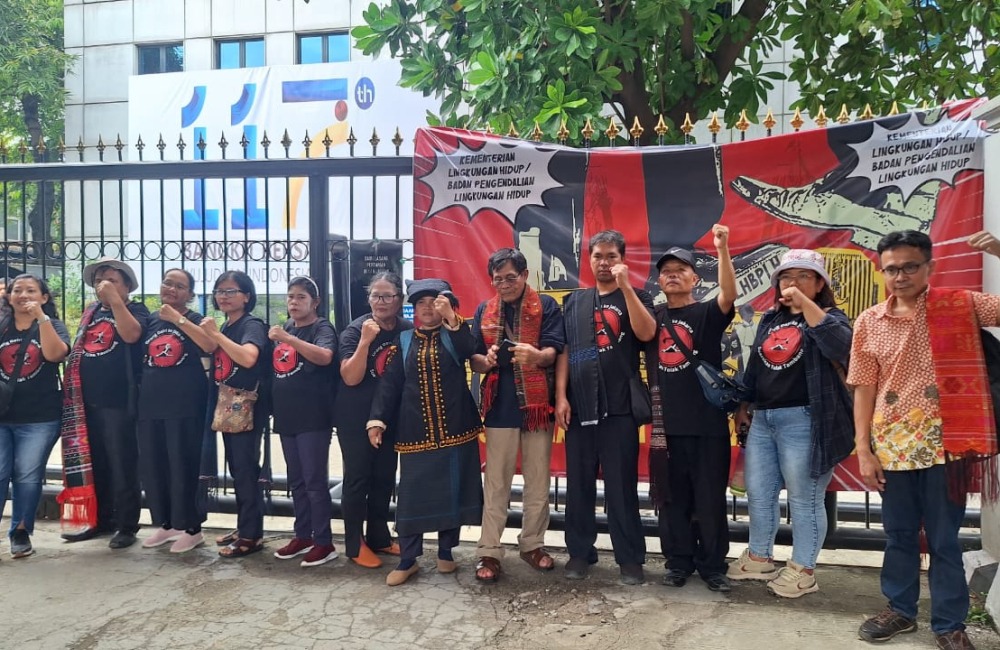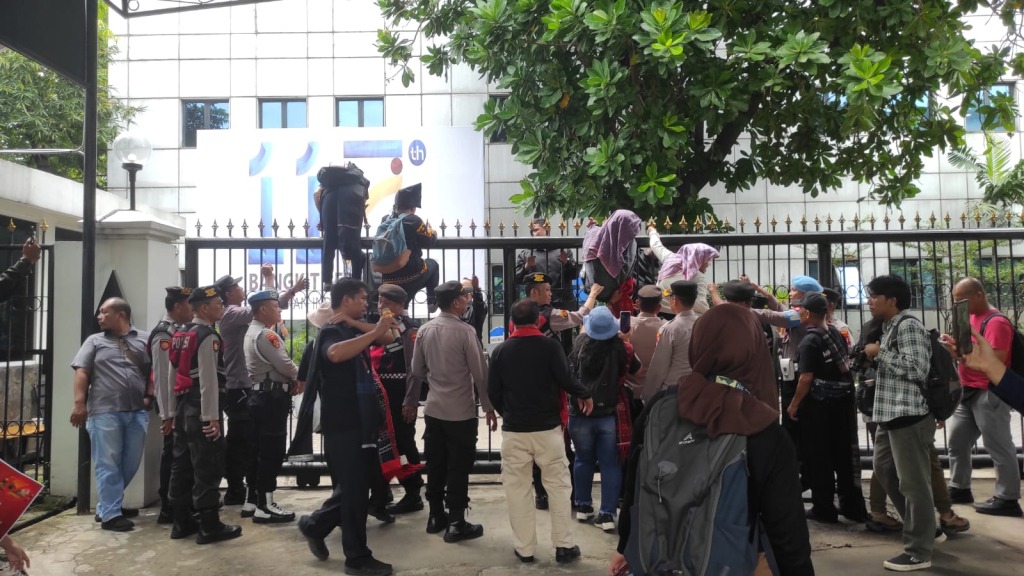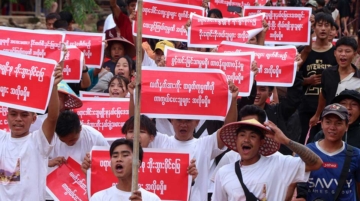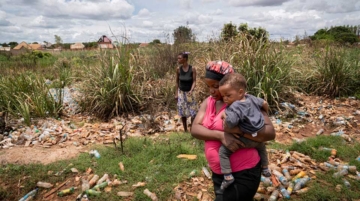
The sounds of mining machinery in the highlands of Indonesia’s North Sumatra province have fallen silent — not due to proactive government intervention or seamless regulatory enforcement, but because of relentless grassroots resistance.
A controversial mining project in the Bukit Barisan mountains, backed by China’s state-owned China Nonferrous Metal Industry’s Foreign Engineering & Construction Co. Ltd. (NFC), has sparked a rare act of grassroots diplomacy. The revocation of PT Dairi Prima Mineral’s (DPM) environmental permit—jointly owned by Indonesia’s Bakrie Group and China’s state-owned China Nonferrous Metal Industry’s Foreign Engineering & Construction Co. Ltd. (NFC)— was not top-down. It was the result of bottom-up pressure and an unusual form of diplomacy: local people directly petitioning a foreign state.

Map of Villages Affected by the River Flow from PT.
A Strategic Mine at the Fault Lines
DPM is more than a private mining venture. It embodies a perfect marriage of local elite interests and China’s global infrastructure ambitions under the Belt and Road Initiative (BRI). As a designated “National Strategic Project,” the mine was shielded from public scrutiny, even though it sits atop three active fault lines in an area that is highly vulnerable to landslides.
The village of Longkotan, the epicenter of DPM’s activities, has borne the brunt of these risks. Residents there, and in neighboring villages like Bongkaras, have raised alarms about environmental degradation, land disputes, and the risk of catastrophe—especially given the area’s history of landslides and the presence of a potentially unstable tailings dam. Dust and noise pollution have further disrupted daily life.
Exclusion, Not Consultation
The company’s community engagement has been minimal, according to Monica Siregar from the local environmental advocacy group YPDK. “There has never been any direct connection between the investor and the community. Even those outside our assistance programs only engage with contractors, and that’s only for road building or tailings dams—not environmental concerns,” she said.
During exploration, only village heads and selected individuals were invited to consultations. Broader public participation was absent—a finding later affirmed by both Indonesia’s Administrative Court (PTUN) and the Supreme Court in 2024.

Dairi residents protest outside Indonesia’s Ministry of Environment, urging enforcement of the Supreme Court ruling and the revocation of PT Dairi Prima Mineral’s environmental permit. May 22, 2025
A Letter to Beijing: Grassroots Diplomacy
In a striking act of grassroots diplomacy, civil society groups bypassed national channels altogether. Forty Indonesian organizations sent a petition directly to the Chinese Embassy in Jakarta, demanding China’s withdrawal from the DPM project, citing the threat to local lives and ecosystems.
There has been no official response. But the initiative itself is noteworthy as a rare example of grassroots diplomacy—community actors appealing directly to a foreign state. “In China’s context, there are no independent NGOs that can bridge the gap. The only route is from people directly to the state,” noted Audo Sinaga of BAKUMSU.
The embassy’s response, or lack thereof, also highlighted structural opacity. According to Siregar, embassy staff accepted the petition but refused to provide contact information for follow-ups.
“They asked for our numbers, but when we requested theirs, they just said, ‘We’ll contact you soon,’” she recalled. No follow-up ever came.

Community advocates submit a petition titled ‘Stop Financing the PT DPM Project’ to the Economic and Commercial Counselor of the Chinese Embassy in Indonesia, signed by 1,170 residents from 15 villages surrounding the site.
China’s Investment Model and the Absence of Civil Channels
This episode highlights a broader divergence between Chinese and Western approaches to investment in the Global South. Whereas Western-funded projects may be more likely to interface with local NGOs or civil society — often due to external compliance or reputational pressure — Chinese-funded ventures tend to bypass such intermediaries altogether. In many cases, it is not that Western firms proactively include local NGOs, but rather that civil society infrastructures and transnational networks make such engagement more accessible. In Dairi, when institutional and governmental channels failed, villagers resorted to engaging with civil society actors — even if those efforts were ultimately ignore
In one such attempt, residents submitted a petition titled “Stop Financing the PT DPM Project” to the Economic and Commercial Counselor of the Chinese Embassy in Jakarta. Signed by 1,170 people from 15 villages encircling the mine, the petition calls on the Chinese government to withdraw financial support from a zinc and lead mining project — a separate venture from the one in Dairi — though it involves the same company and shareholders. Authorities argue that the project poses grave risks to human safety.
Nevertheless, on April 27, 2024, China Nonferrous Metal Industry’s Foreign Engineering and Construction Co., Ltd. (NFC)—the majority shareholder in PT DPM—announced it had secured a US$245 million loan from Carren Holdings Corporation Limited to fund project development near Parongil, North Sumatra. Carren Holdings is registered in Hong Kong and wholly owned by CNIC Corporation Limited, which itself is fully controlled by China’s State Administration of Foreign Exchange (SAFE).

Citizen and Civil Society Action Urging the Ministry of Environment and Forestry to Enforce the Supreme Court Ruling, Jakarta, May 2025 (YPDK)
Legal Precedents, Political Inertia
Indonesia’s Ministry of Environment described the permit revocation as a legal milestone. Still, questions remain about the government’s sluggish response. Local communities argue that revocation is not enough; they demand a permanent halt to DPM’s operations.
“This is farmland, not an extractive industrial zone,” Sinaga asserted.
Meanwhile, Siregar confirmed that residents are preparing to report DPM once again to the Ministry’s law enforcement division, citing illegal continued activity. “If the law can only be upheld by citizens, those citizens are bound to be suppressed,” she warned.
Closed-Off Avenues
The Dairi story is not just about zinc or landslides. It’s a story of a community whose lands are being shaped by the seemingly unstoppable forces of transnational capital and state-to-state diplomacy. With formal channels closed, villagers are carving out space to be heard from below.
Dairi reveals the fault lines of this development model. Local communities often have limited avenues to voice their concerns, even with non-Chinese partners, due to the constrained effectiveness of existing civil society organizations and NGOs. However, with Chinese-backed projects, these channels are entirely absent, leaving grassroots diplomatic activism as one of the few ways for locals to challenge the development imposed on them. Dairi is a story when top-down infrastructure meets bottom-up resistance. These avenues for community participation and transparency are sorely needed. Without them, promises of development risk becoming extractive realities.








